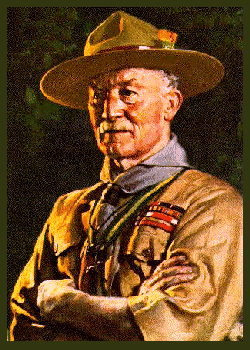
Wearing the Uniform

Baden-PowellHow does Scouting Work?
In this game, we still use traditional Scouting activities, such as camping, hiking, canoeing, and all the details that go with them, as tools to teach good citizenship. In addition, we "spice up" the program with other activities that are educational, fun, and help develop our Troop into a cohesive unit. These activities might include trips to national landmarks, computer or radio conversations with Scouts around the world, pizza parties, and more. B-P said , "The program of the Boy Scouts is a man's job cut down to boy's size."
As noted above, Scouting is under the leadership of boys. We use something called the "Patrol Method" in Scouting. The most basic unit of Scouting, a Patrol is comprised of six to eight boys. B-P felt that this was a natural and workable size "fraternity-gang" that a boy could feel comfortable in. A Troop is made up of two or more Patrols, with the ideal number being four. Quoting B-P again, "The Patrol System is the one essential feature in which Scout training differs from that of all other organisations, and where the System is properly applied, it is absolutely bound to bring success. It cannot help itself!"
Each patrol is lead by a "Patrol Leader", a more senior boy elected by it's members. He chooses an Assistant Patrol Leader, and the Patrol's members also elect a Patrol Scribe and Patrol Quartermaster. The Scribe keeps track of any Patrol records and takes care of any correspondence. The Quartermaster is in charge of the Patrol's equipment and it's condition.
All the boys in the troop elect a Senior Patrol Leader (SPL) to lead the entire Troop, as well as a Troop Scribe and Quartermaster. The SPL then appoints his Assistant Senior Patrol Leader (ASPL). The SPL and ASPL must be at least First Class Scouts. The Troop Scribe and Quartermaster should be as well.
The SPL, ASPL and the Patrol Leaders form what is known as a "Patrol Leader's Council", who meet frequently to plan and oversee the Troop's activities. They do so under the quiet, but firm guidance of the Scoutmaster and his assistants.
The Patrol system is designed to give the boys maximum responsibility for planning and carrying out the program, within the guidelines set by the BSA National Council, the Troop Committee and the Scoutmaster. The Scoutmaster and his assistants act as mentors and teachers to the boys, and provide constant guidance to the Patrol Leader's Council. While the boys are truly "in charge", they do not have absolutely free reign. The Scout program is the basis for all activities. They must fit into it in a balanced way, and no activity may violate the Scout Oath or Laws.
B-P saw the Scoutmaster and his assistants acting in the capacity of a "big brother" rather than as a "parent" or "teacher" figure.
"Like the true older brother", he wrote, "he has to realise the the traditions of the family and see that they are preserved, even if considerable firmness is required."
He listed the following guidelines for Scoutmasters:
"He has simply to be a boy-man, that is:
- He must have the boy spirit in him; and must be able to place himself on a right plane with his boys as a first step.
- He must realise the needs, outlooks, and desires of the different ages of boy life.
- 3. He must deal with the individual boy rather than with the mass.
- 4. He then needs to promote a corporate spirit among his individuals to gain the best results."